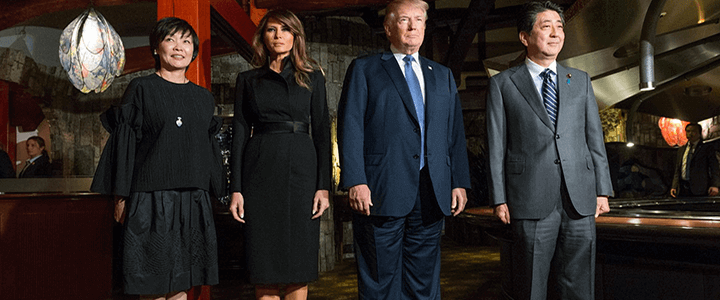The president’s Asian trip is in full swing, and if you only paid attention to the detractors, you’d think he doesn’t know either how to feed fish or that Japanese automobile manufacturers have factories in the United States. Both, of course, are gross exaggerations of what actually happened, but when your default position is “Trump is a buffoon,” grossly exaggerating is far easier than actually analyzing what’s happening.
And this trip is newsworthy for many reasons.
Japan and Missile Defense
First, the bombastic, shoot-from-the-hip Trump appears, for the most part, to have stayed in Washington. The president has been remarkably cautious in his public statements, sticking to the prepared remarks, to the point of sounding subdued. Better that than an international incident.
Even the apparent gaffe of referring to Japan as a “nation of samurai warriors” was not a public pronouncement. Nor did it seem to offend Japanese Prime minister Shinzo Abe, who ranks as one of Trump’s closest friends among world leaders. There are several potential reasons why Japan chose not to intercept the North Korean missiles fired over their territory.
It could be that they correctly determined the missiles would fly harmlessly into the ocean well past the islands. It could be that the data collected from observing the missile’s trajectory was more important than whatever political gains would come from an intercept. It could be that they’re not confident in the PAC3 missile’s capability (although this weekend’s apparent successful intercept of a Yemeni missile over Riyadh, Saudi Arabia should put those fears largely to rest).
Trump clearly expects Japan to buy more American military hardware. A few THAAD batteries would be a nice place to start.
Korea trip is almost boring
Speaking to reporters Korea, Trump emphasized (but did not specify) the diplomatic progress on the North Korean nuclear issue. In an appearance with President Moon Jae-in of the Republic of Korea, Trump said, “I think we’re making a lot of progress, I think we’re showing great strength, I think they understand we have unparalleled strength.” Later, alongside U.S. commander Gen. Vincent K. Brooks, the president struck what could be considered a conciliatory tone, saying “Ultimately it will all work out. Because it always works out — has to work out.”
Meanwhile, the reaction from the neighbors to the north side of the Demilitarized Zone has been… silence.
The press was quick to note that Trump offered no specifics on what type of progress has been made on the diplomatic front. But in the run-up to this trip, many observers were in full-blown hand wringing mode, worried that the DPRK would test another missile while Trump was in the south. The day is over in Korea, and there has been no missile test, no nuclear test, and no other public military exercises.
North Korean dictator Kim Jong-un is being as uncharacteristically restrained as Trump. Other than praising the anti-Trump protesters, the Korean Central News Agency, the official outlet of the DPRK government, has been quiet. There has been none of the typical chest thumping and saber rattling we’ve come to expect from Kim.
It’s almost as if something were happening behind the scenes.




